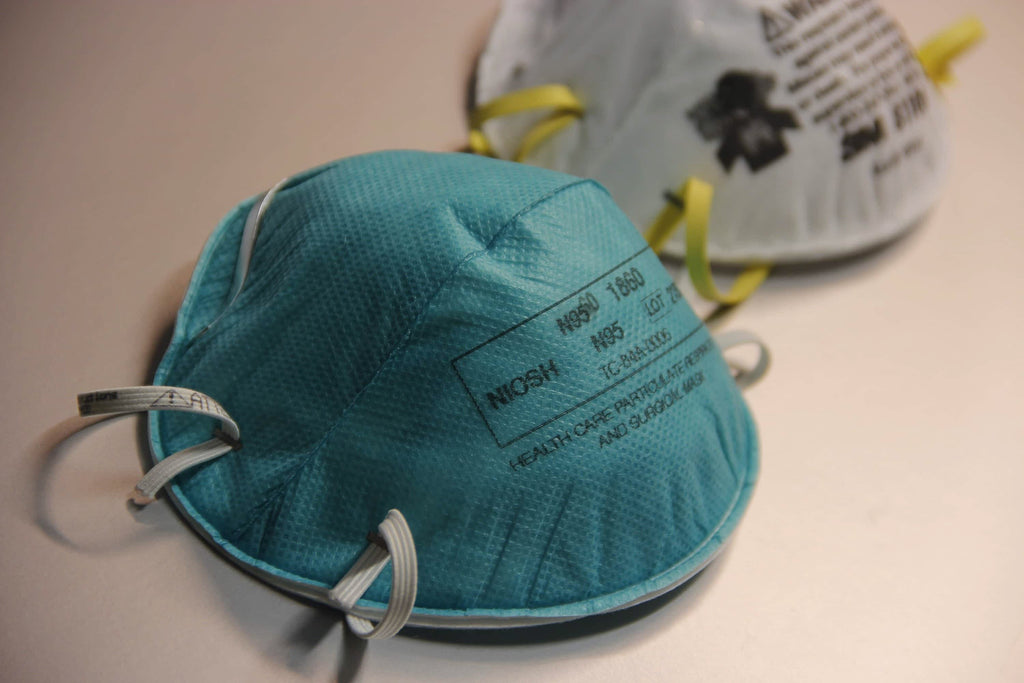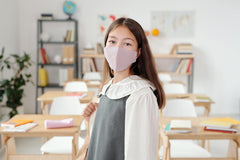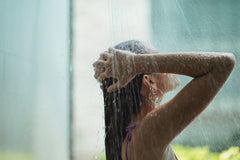FluShields Explains Whether Your KN95 or N95 Face Mask is A Counterfeit
 Photo by CDC from Pexels
Photo by CDC from Pexels
Counterfeit respirators are products offered and falsely marketed as being NIOSH-approved, but might not be capable of giving appropriate protection. As the N95 masks become harder and harder to get, the KN95 mask has emerged as a perfect alternative for healthcare providers who work on the front lines of the COVID-19 pandemic.
The N95 and KN95 masks are essentially the same and meet strict requirements. They both provide 95% filtration of particles >0.3 microns in size. KN95 is the Chinese code, and N95 is the code used in the USA. With these respirator masks in high demand, many scam shops popped up on the internet selling counterfeit, or fake masks that don’t even come close to government standards. That’s why we’ve pulled together some tips on how to tell a real KN95 mask from a fake.
How to identify a NIOSH-approved respirator?
You can visually identify if the respirators are NIOSH-approved if they have an approval label on or within the packaging of the respirator (on the box itself or within the users' instructions). Also, the abbreviated approval is on the FFR itself.
NIOSH-approved FFRs will always have one of the following designations: N95, N99, N100, R95, R99, R100, P95, P99, P100. By verifying the specific designation for a certain respirator, you can be assured that your respirator mask is not a counterfeit. You can also confirm and verify the approval number on the NIOSH Certified Equipment List (CEL) or the NIOSH Trusted-Source page.
Just look for online medical equipment or PPE suppliers like us who are upfront in their descriptions of the products. You want KN95 masks that:
- Meet standards similar to NIOSH, including KN95 respirator masks with head straps or ear loops that meet standards GB 2626-2006, GB 2626-2019, and GB 19083-2010.
- Are FDA and CE compliant.
- Have the standard markings and prints on the masks and the packaging.
- Are not being offered at a ridiculously high price.
👇 FluShields donates 3% of every order you place. You can top, round up, or give as much as you fancy at checkout. Our team and our customers like you are proud to have...
Click the tiny info button for details 👆
Signs that a respirator may be counterfeit:
- There are NO markings at all on the filtering face piece respirator
- There is NO approval (TC) number on filtering face piece respirator or headband
- There are NO NIOSH markings
- NIOSH spelled incorrectly, an obvious counterfeit
- You can see the presence of decorative fabric or other decorative add-ons (e.g., sequins)
- There are claims for the approval for children but NIOSH does not approve any type of respiratory protection for children.
- Filtering face piece respirator has ear loops instead of headbands
You can also test your KN95 mask at home to check if they are legitimate. Here are 3 quick tests:
1. The Lighter Test
- Put on your respirator mask.
- Hold a lighter six inches from your mouth and activate it. Be careful!
- Try to blow out the flame.
Certified KN95 mask: You won’t be able to blow out the flame no matter how hard you try.
Counterfeit mask: You can blow the flame out.
In order to meet the strong standards, lab-tested KN95 masks must be made of strong but breathable full mesh nylon. The nylon must meet for inspiratory resistance (meaning: <=350 Pa) and expiratory resistance (meaning: <=250 Pa) — “Pa” is short for “Pascals”, which is the international unit of measurement for air pressure. This means that the nylon obstructs contagions like viruses from passing through during inhalation and exhalation while still allowing comfortable air circulation.
2. The Smell-Test
- Put on your respirator mask.
- Put a half cut onion onto a spoon or flat surface.
- Try sniffing with the mask on, then take the mask off and sniff again, making note of any difference.
Certified mask: You catch the onion fragrance, but just barely.
Poor quality mask: You can still smell the onion in full force.
This is because a certified lab-tested KN95 mask has a filtration rate of >=95%. It is designed to filter out at least 95% of particles sized 3 microns or larger. Onion particles are about seven microns or bigger in size, so if you can smell the Onions full scent strength through your mask, its filtration ability is just not as good as a legitimate KN95 mask.
3. The Water Test
- Pick up your respirator mask and hold it by the elastic bands, with the inside of the mask facing up.
- Fill the mask with water.
Certified mask: The mask holds the water with zero leakage.
Poor quality mask: Water leaks from the mask.
Certified respirator masks must have a waterproof layer to protect you from any splashes of biological fluids. The Occupational Health and Safety Administration (OSHA) recommends during a shortage of respirator masks, that you can actually wash and reuse your KN95 mask as long as it “maintains its structural and functional integrity and the filter material is not physically damaged or soiled.”
Be vigilant and be knowledgeable in buying the right respirators for you, your family, and friends.
Here at FluShields we are committed to doing our part to serve healthcare professionals and first responders who put their lives on the line every day to serve us. We provide KN95 masks from our own inventory — enabling us to ship products incredibly fast for great prices: in small or big quantities.
We can assure you that our KN95 masks are FDA and CE compliant. We can provide documentation at your request.
Good news: You can also protect yourself as much as possible from viruses by wearing an FFP3 or KN95 respiratory mask: Get your KN95 respirator masks & replacement filters for the whole family today.
Disclaimer: Please note that we can only pass on general information and cannot make any guarantees or be liable for any consequences of your decision making or behavior. Use good common sense and ask your healthcare provider or physician for advice.
Thanks for stopping by. Please leave your comments, ideas, or feedback below so we can continue to provide you with great content.






